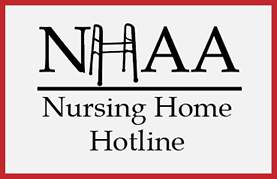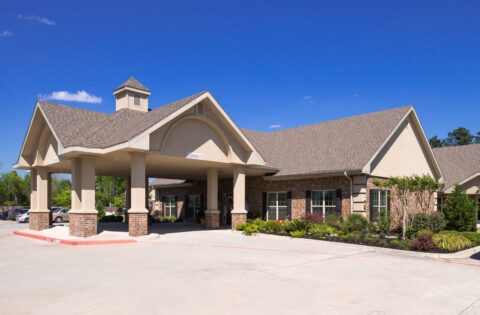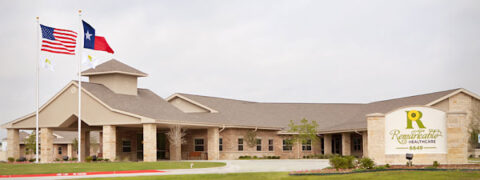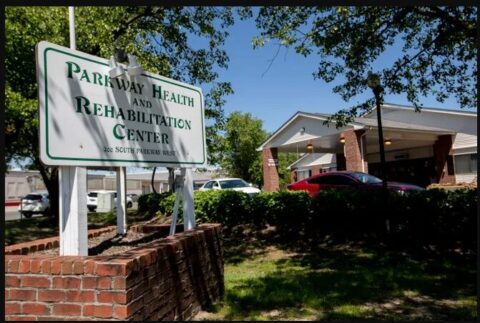State Findings:
Based on observations, interviews, and review of the policy titled ‘Restraints’, the facility failed to ensure three residents (R) (R#36, R#64 and R#65) were free from the use of physical restraints. The sample size was 26. Findings include:
Review of the undated policy titled ‘Restraints’ revealed under procedural guidelines- Prior to use of a restraint, the following should be completed: 1. Patient’s need for restraint assessed.
2. Restraint Consent.
This includes the patient and/or responsible party consent, as well as reason for restraint and type of device.
3. Physician order for device (to include type of device, and when it may be used).’
1. Review of the electronic medical record (EMR) revealed that R#36 was admitted to the facility on [DATE] with diagnoses including but not limited to Huntington’s disease, dementia, dysphagia, and aphasia.
Review of Significant Change Minimum Data Set (MDS) dated [DATE] revealed Section C-Cognitive Patterns resident is rarely/never understood and has both short and long-term memory problems. Section G-Functional Abilities revealed R#36 is dependent on one-person physical assistance with activities of daily living (ADLs). Section P-Restraints revealed R#36 does not use physical restraints.
Observation on 9/27/22 at 11:48 a.m. revealed R#36 was in bed with full size bedrails in the up position on both sides of bed.
Observation on 9/28/22 at 9:46 a.m. revealed R#36 was in bed with full size bedrails in the up position.
Observation on 9/29/22 at 9:33 a.m. revealed R#36 was in bed with full size bedrails in the up position.
Review of R#36 Physician orders did not reveal an order for use of full-size bed rails.
Review of care plan intervention dated 3/3/21 revealed ‘full bedrails for safety due to diagnosis’.
Interview on 9/29/22 at 9:46 a.m. with Certified Nursing Assistant (CNA) CC revealed she was unsure why R#36 had full size bed rails. She stated that she thinks the resident has the full-size bedrails because he jerks a lot, and they will prevent him from falling out of bed.
Interview on 9/29/22 at 9:53 a.m. with the Director of Nursing (DON) revealed the facility does not use restraints. She stated that the resident has full size bedrails because he has Huntington’s disease, which causes him to move around involuntarily and puts him at risk for falls.
Interview on 9/29/22 at 9:55 a.m. with Senior Nurse Consultant (SNC) revealed the full-size bedrails are not a restraint because resident cannot get up on his own. States the facility does not write orders for the use of these devices but only does an assessment.
Follow-up interview on 9/29/22 at 12:17 p.m. with the SNC revealed the facility does not have a policy on the use of bedrails. Stated they go by the Center for Medicare and Medicaid Services guidelines.
2. Review of the EMR revealed that R#65 was admitted to the facility on [DATE] with diagnoses including but not limited to senile degeneration of the brain, dementia, mood disorder, and anxiety.
Review of R#65’s quarterly MDS dated [DATE] revealed a Brief Interview for Mental Status (BIMS) score of three out of 15, indicating severe cognitive decline. Section G-Functional Abilities revealed R#65 was dependent on one to two-person physical assistance with activities of daily living (ADLs). Section P-Restraints revealed R#65 does not use physical restraints.
Observation on 9/27/22 at 1:49 p.m. revealed R#65 in a reclined broda Chair. Alert but disoriented. CNA CC reports this is usual for resident. Resident observed attempting to get out of chair independently. CNA CC observed reclining chair back to prevent resident from getting out of chair independently.
Observation on 9/28/22 at 9:47 a.m. R#65 was observed in reclined broda chair resting quietly.
Observation on 9/28/22 at 10:40 a.m. revealed R#65 attempting to get out of broda chair. CNA CC raised the footrest on the chair to prevent resident from getting out of the chair.
Observation on 9/29/22 at 8:58 a.m. revealed R#65 in the broda chair with chair reclined and footrests raised.
Interview on 9/29/22 at 9:46 a.m. with CNA CC revealed resident has had this chair approximately one month because of a fall. She further revealed she had not received training on this type of chair. CNA CC stated R#65 attempts to get up when agitated and she reclines him when he is attempting to get up. Once reclined, resident is unable to get up.
Interview on 9/29/22 at 9:53 a.m., the DON revealed the facility does not consider the broda chair a restraint because R#65 cannot walk. She sates the chair is an enabler and that facility does not use restraints. The DON also revealed R#65 is in the broda chair to prevent falls.
Interview on 9/29/22 at 9:55 a.m. with the SNC revealed the broda chair is not a restraint because R#65 cannot walk. The SNC stated the facility does not write orders for the use of these types of devices but only does an assessment.
Review of R#65’s medical record did not reveal an assessment for the use of the Broda chair.
3. Review of the EMR for R#64 revealed resident was admitted to the facility on [DATE] with diagnoses of but not limited to orthostatic hypotension, unsteadiness on feet, difficulty in walking, displaced intertrochanteric fracture of right femur and unspecified dementia without behavioral disturbance.
Review of the most recent MDS dated [DATE], revealed a BIMS was coded as 99, which indicated resident was unable to complete the assessment. Section G revealed resident requires total assistance with transfers.
Review of a care plan revised on 9/6/22, revealed the resident was at risk for falls related to falls x 3. Interventions – Assist patient with ADL’s and mobility as needed, assist pt to quite location, and md to do med review, bed in low position, dycem added to wheelchair, encourage patient to call when needing assistance, footwear, provide non-skid socks as needed, mat at bedside: left, moved resident to room [ROOM NUMBER]c to be closer to the nurses station, non-skid shoes, well-fitting shoes, placed resident in Geri chair and brought to nurses station for observation, remind patient to call when needing assistance, Resident is still weak at this time from covid diagnosis. Currently working with therapy to regain her strength. Continue with therapy and encourage resident to call for assistance, therapy referral, therapy referral made for unsteady gait, wheelchair with anti-tippers.
Review of a Resident’s Consolidated Order revealed R#64 did not have a physician’s order for the reclined Geri-chair. A review of the resident’s medical record revealed no evaluations or follow up for the use of the restraint (Geri-chair).
Observation on 9/28/22 at 9:38 a.m. revealed R#64 sitting in a Geri Chair reclined in her room.
Observation 9/28/22 at 11:54 a.m. R#64 is sitting up in a reclined Gerichair. An unidentified staff member is in the room with resident conversing with resident as she prepares her bed to assist resident in the bed.
Observation 9/29/22 at 9:10 a.m. R#64 was out of bed in a reclined Geri chair in her room.
Observation 9/29/22 at 11:14 a.m. R#64 was in her room sitting in a reclined Geri chair with a blanket covering her face.
Interview on 9/28/22 at 9:38 a.m., CNA CC stated R#64 constantly tries to get up when she’s in the bed so she keeps resident in the reclined Geri chair because it is hard for her to get out of the chair. CNA pushed resident to the nurses’ station in the Geri chair to be monitored by staff. CNA CC further stated that she keeps the chair reclined to keep resident from getting up.
Interview on 9/29/22 at 8:48 a.m., Licensed Practical Nurse (LPN) DD stated R#64 was placed in the Gerichair due to recent falls. LPN DD further stated that she is not sure when resident was placed in the Gerichair, but she has been utilizing the Gerichair for about 2 weeks.
Interview on 9/29/22 at 10:51 a.m. with the DON stated that the facility does not have a formal assessment which is completed prior to resident using devices to determine if the device is deemed a restraint or an enabler. DON further stated that the facility has a mobility care plan and Quarterly Comprehensive Assessment. DON stated that R#64 uses the Gerichair for mobility to get from one place to another place and that the gerichair is a mobile device. Surveyor questioned DON as to whether resident could self-propel the Gerichair or the wheelchair. DON responded; no R#64 cannot move the reclined Gerichair on her own, but she was able to self-propel the wheelchair. DON told surveyor that she considers R#64’s gerichair it a device for safety and mobility, and she does not think of it as a restraint.
Interview on 9/29/22 at 11:34 a.m., the Regional Nurse stated that residents are assessed when there is a change in the devices. This information is taken to Patients At Risk weekly meeting with the Interdisciplinary Team. The changes are discussed. She further stated that there is not a formal titled device assessment completed to determine or classify devices such as Geri chair, broada chairs, or bolsters. She stated that they follow Centers for Medicare and Medicaid (CMS) guidelines and utilize them to determine the classification of the device. There is not an assessment completed when resident gets bolsters or goes from a wheelchair to a Geri chair.
Your Experience Matters
...and we want to hear it.
NHAA is here to assist families, residents, and the community by sounding the alarm on issues like those found above. This nursing home and many others across the country are cited for abuse and neglect.
If you have or had a loved one living in this nursing home or any other nursing home where you suspect any form of abuse or neglect, contact us immediately.
We have helped many already and we can help you and your loved one as well by filing a state complaint, hiring a specialized nursing home attorney or helping you find a more suitable location for your loved one.
You can make a difference, even if your loved one has already passed away.
Please give us a call at 1-800-645-5262 or fill out our form detailing your experience.
Personal Note from NHA-Advocates
NHAA shares with all the families of loved ones who are confined to nursing homes the pain and anguish of putting them in the care of someone else. We expect our loved ones to be treated with dignity and honor in the homes we place them. We cannot emphasize enough to family members of nursing home residents; frequent visits are essential to our loved ones’ well-being and safety.
If you are struggling and upset, click here to understand your options, or contact us through our contact form or call our toll free hot line number: 1-800-645-5262.








